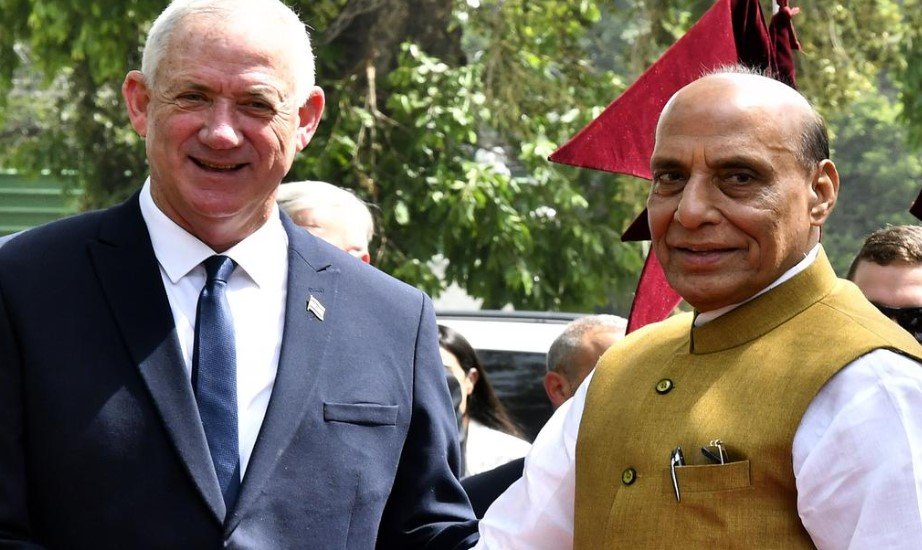New Delhi, Tel Aviv ramp up military partnership after Pahalgam attack and Gaza conflict shake regional security outlooks
India and Israel are stepping up their defence cooperation with a renewed sense of urgency, shaped by a spate of terror attacks and fast-changing regional power dynamics. On Wednesday, the two countries agreed to push their long-standing military relationship into a new phase, one that prioritizes institutional structure, strategic depth, and shared security intelligence.
The agreement came during a high-level meeting in New Delhi between India’s Defence Secretary Rajesh Kumar Singh and Major General Amir Baram, Director General of Israel’s Defence Ministry. While the two sides have been allies for decades, the tone of this week’s discussions reflected a deeper alignment—and a growing sense of shared threat.
Pahalgam Attack Condemned, October 7 Still Looms Large
It wasn’t just about weapons, deals, or procurement pipelines. The conversation took a hard political turn.
Baram opened the dialogue by condemning the April 22 terror attack in Pahalgam, Jammu and Kashmir—a brutal strike that left multiple Indian security personnel dead. It wasn’t just a diplomatic gesture. It was framed as solidarity, as one victim of terrorism to another.
Singh, in return, denounced the October 7, 2023 Hamas-led attacks on Israel, echoing Tel Aviv’s demand for the immediate release of hostages still held in Gaza. That exchange underscored just how much India and Israel see their national security challenges as linked—even though the geography is vastly different.
“These are not isolated incidents,” one Indian official familiar with the talks told BharatShakti. “They are part of a global pattern of asymmetric warfare. India and Israel know that better than most.”

What the New Defence Framework May Look Like
Both sides agreed to start building a structured institutional framework to support bilateral defence ties. Right now, the relationship is mostly deal-driven: Israel sells drones, radar, missiles, and cybersecurity systems; India buys and deploys them.
What’s being proposed now is a shift from transactional to strategic.
Sources say the framework may include:
-
Joint working groups on critical technologies
-
Real-time intelligence sharing on terror networks and cyber threats
-
Co-development and co-production agreements, especially in aerospace and counter-drone tech
-
Military-to-military exchanges at the senior officer level
-
Simulation training for special forces and counter-terror units
One Israeli official described the idea as “making the architecture match the ambition.” Until now, most cooperation has been informal and operational. That’s about to change.
India-Israel Defence Ties: A Quick Snapshot
Over the past two decades, Israel has quietly become one of India’s top defence partners—supplying everything from radar and night-vision systems to armed UAVs and missile defence batteries. Here’s a snapshot of the relationship:
| Defence Segment | Key Israeli Contributions to India |
|---|---|
| Air Defence | Barak-8 SAM systems, radar for naval ships |
| Drones & UAVs | Heron surveillance drones, loitering munitions |
| Cybersecurity | Tools for intelligence and threat detection |
| Small Arms & Ammo | Tavor rifles, Galil sniper systems, tactical gear |
| Surveillance Systems | AESA radar, battlefield management software |
India, for its part, offers Israel a massive defence market, a potential co-manufacturing base, and deep political goodwill. The partnership has outlasted changes in government in both countries—and grown under leaders like Narendra Modi and Benjamin Netanyahu.
Shared Terror Concerns Are Bringing the Two Closer
While military deals are the headline-makers, what really seems to be driving the urgency is mutual threat perception.
For India, cross-border terror from Pakistan remains a persistent risk. The Pahalgam attack in April revived fresh concerns about infiltration, radicalisation, and militant financing in Kashmir.
For Israel, the October 7 attacks marked the deadliest day in its modern history—and shifted the country’s national security doctrine overnight.
“There’s a symmetry here,” said Lt. Gen. (Retd.) S.L. Narasimhan, a former Indian military attaché. “Both countries face non-state actors with state sponsors. That creates a natural foundation for trust.”
And it’s not just about guns and bullets. Cyberattacks, drone swarms, disinformation campaigns—all these are now part of modern conflict. And both India and Israel are actively preparing for this new battlefield.
What’s Next: Tech Transfers, Joint Ventures and Bigger Strategic Bets
Looking ahead, several possibilities are on the table:
-
A possible joint production line in India for loitering munitions (aka kamikaze drones)
-
Expansion of joint R&D in areas like laser-based air defence and autonomous combat vehicles
-
Greater integration of Israeli systems into India’s Theatre Command restructuring process
-
Closer collaboration in cybersecurity and AI-driven surveillance tools
Defence analysts believe the scale of cooperation is set to widen, not just in tactical gear but in strategic thinking. India sees Israel as a pioneer in layered defence and counter-insurgency. Israel sees India as a major power with clout, manpower, and staying power in Asia.
If all this plays out, the India–Israel defence axis could become one of the most critical bilateral partnerships in the 21st century security landscape.
